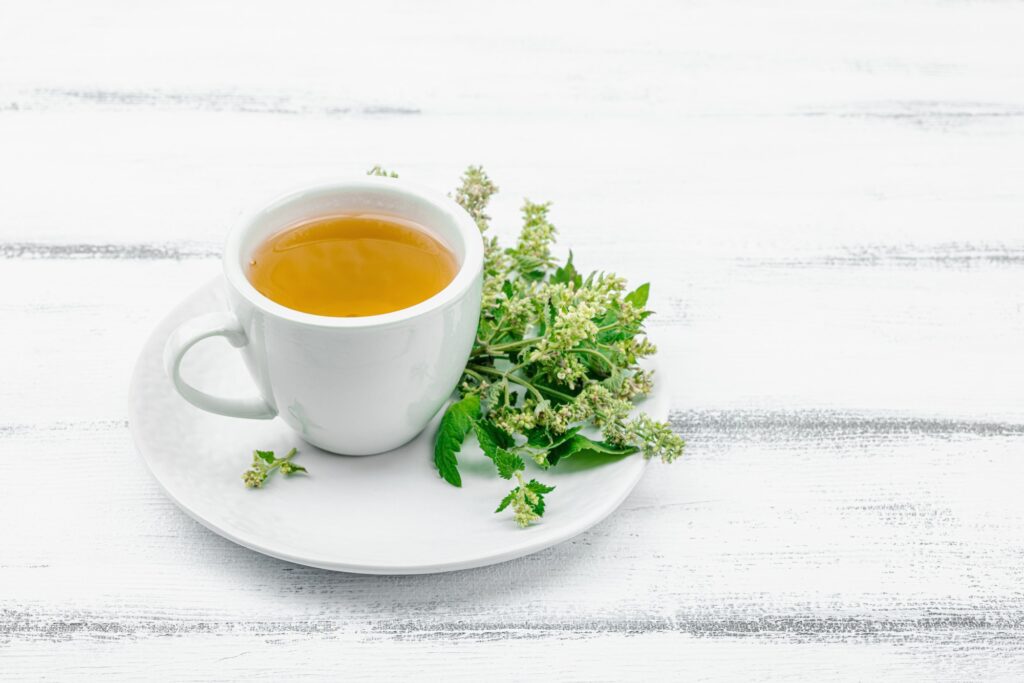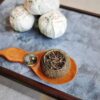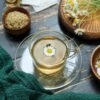
Melissa lemon balm tea has long been revered for its calming and therapeutic properties. This aromatic herbal infusion, derived from the Melissa officinalis plant, has been used for centuries to promote relaxation, alleviate stress, and support overall well-being. As a natural remedy, melissa lemon balm tea offers a gentle and holistic approach to addressing a variety of health concerns, making it a popular choice among those seeking a more natural path to wellness.
The History and Origins of Melissa Lemon Balm Tea
The use of melissa lemon balm, also known as Melissa officinalis, can be traced back to ancient civilizations. This versatile herb has been revered for its medicinal properties since the time of the ancient Greeks and Romans, who used it to treat a variety of ailments, from digestive issues to anxiety and depression.
The name “melissa” is derived from the Greek word for “honey bee,” as the plant’s sweet, lemony aroma has long attracted these pollinating insects. Melissa lemon balm is native to the Mediterranean region and has since spread to various parts of the world, becoming a staple in traditional herbal medicine practices.
In the Middle Ages, melissa lemon balm was highly prized for its calming effects and was often used in monastic gardens and apothecaries. Over time, its popularity has endured, and today, it remains a beloved ingredient in many herbal tea blends and natural wellness products.
Health Benefits of Melissa Lemon Balm Tea
Melissa lemon balm tea is renowned for its wide-ranging health benefits, making it a versatile and valuable addition to any wellness routine. Here are some of the key benefits associated with this soothing herbal infusion:
- Stress and Anxiety Relief: Melissa lemon balm has been shown to have a calming effect on the nervous system, helping to reduce feelings of stress, anxiety, and restlessness. Its active compounds, such as rosmarinic acid and citronellal, have been found to have a positive impact on mood and cognitive function.
- Improved Sleep Quality: Melissa lemon balm tea can be a natural sleep aid, helping to promote relaxation and improve the quality of sleep. Its sedative properties can be particularly beneficial for those struggling with insomnia or sleep-related disorders.
- Digestive Support: Melissa lemon balm tea has been used traditionally to soothe digestive issues, such as bloating, gas, and indigestion. Its carminative properties can help to alleviate these common gastrointestinal concerns.
- Anti-inflammatory Effects: Studies have shown that melissa lemon balm possesses anti-inflammatory properties, making it potentially useful in the management of conditions like arthritis, muscle pain, and skin irritation.
- Cognitive Enhancement: Melissa lemon balm has been associated with improved cognitive function, including enhanced memory, concentration, and mental clarity. This makes it a popular choice for those seeking a natural way to support brain health.
- Antioxidant Protection: Melissa lemon balm is rich in antioxidants, which can help to protect the body against the damaging effects of free radicals and support overall cellular health.
- Immune System Support: Some research suggests that melissa lemon balm may have immune-boosting properties, potentially helping to strengthen the body’s natural defenses against illness and infection.
By incorporating melissa lemon balm tea into one’s daily routine, individuals can harness the power of this versatile herb to promote relaxation, improve overall well-being, and support a healthier lifestyle.
How to Make Melissa Oil from Lemon Balm Tea
In addition to enjoying the benefits of melissa lemon balm tea, it is also possible to extract the essential oil from the herb, which can be used in a variety of applications. Here is a simple guide on how to make melissa oil from lemon balm tea:
- Gather the necessary ingredients: fresh or dried melissa lemon balm leaves, a carrier oil (such as olive, coconut, or jojoba oil), and a clean glass jar with a tight-fitting lid.
- Gently crush or bruise the melissa lemon balm leaves to help release their essential oils.
- Place the crushed leaves in the glass jar and cover them with the carrier oil of your choice, ensuring that the leaves are fully submerged.
- Seal the jar and place it in a cool, dark place, such as a cupboard or pantry. Allow the mixture to infuse for 4-6 weeks, shaking the jar occasionally.
- After the infusion period, strain the oil through a fine-mesh sieve or cheesecloth to remove the plant material.
- Store the resulting melissa oil in a clean, dark-colored glass bottle, away from direct light and heat. This oil can be used in a variety of ways, such as in aromatherapy, topical applications, or as an ingredient in homemade skin care products.
Where to Buy Melissa Lemon Balm Tea
Melissa lemon balm tea can be found in a variety of places, both online and in physical retail stores. Here are some of the most common sources:
- Local Health Food Stores: Many natural and organic grocery stores, as well as specialty tea shops, carry melissa lemon balm tea in their selection of herbal teas.
- Online Retailers: Websites such as Amazon, Vitacost, and specialty tea retailers often have a wide variety of melissa lemon balm tea options available for purchase.
- Herbal Apothecaries: Some traditional herbalists and apothecaries may offer high-quality, small-batch melissa lemon balm tea blends sourced directly from growers.
- Farmer’s Markets and Local Producers: If you have access to local farms or producers, you may be able to find freshly harvested melissa lemon balm leaves or tea blends directly from the source.
When purchasing melissa lemon balm tea, it’s important to look for organic, high-quality ingredients and to ensure that the tea is free from any additional fillers or artificial additives. Additionally, consider the source and reputation of the brand or seller to ensure you are getting a product that is both safe and effective.
How to Brew Melissa Lemon Balm Tea for Maximum Flavor and Benefits
Brewing the perfect cup of melissa lemon balm tea requires a bit of attention to detail, but the results are well worth the effort. Here are some tips to help you achieve the most flavorful and beneficial infusion:
- Choose High-Quality Leaves: Start with fresh, organic melissa lemon balm leaves or a high-quality, loose-leaf tea blend. Avoid pre-bagged tea, as it may not provide the same level of potency and flavor.
- Use the Right Water Temperature: Melissa lemon balm is best brewed with water that is just off the boil, around 195°F to 205°F (91°C to 96°C). Boiling water can sometimes scald the delicate leaves and result in a bitter taste.
- Steep for the Optimal Time: For maximum flavor and benefits, steep the melissa lemon balm tea for 5 to 7 minutes. Steeping for too long can result in a more bitter or astringent taste.
- Cover the Teapot: Keeping the teapot covered during the steeping process helps to retain the essential oils and volatile compounds that contribute to the tea’s aroma and therapeutic properties.
- Consider Blending: Many people enjoy blending melissa lemon balm tea with other calming herbs, such as chamomile, lavender, or valerian root, to create a more complex and customized infusion.
- Adjust to Personal Taste: The strength of the tea can be adjusted to personal preference by using more or less of the dried leaves or adjusting the steeping time. Experiment to find the perfect balance of flavor and potency.
By following these guidelines, you can ensure that your melissa lemon balm tea is brewed to perfection, allowing you to fully experience its soothing and restorative benefits.
Melissa Lemon Balm Tea Recipes for Relaxation and Wellness
Melissa lemon balm tea can be enjoyed on its own or incorporated into a variety of recipes to enhance its calming and therapeutic properties. Here are a few delightful and wellness-focused recipes to try:
- Melissa Lemon Balm Tea Latte:
- Brew a strong cup of melissa lemon balm tea
- Heat and froth your choice of milk (dairy, almond, or oat milk)
- Combine the tea and frothed milk, and sweeten with a touch of honey or maple syrup
- Melissa Lemon Balm Tea Smoothie:
- Blend together melissa lemon balm tea, frozen fruit (such as berries or mango), a banana, and your choice of milk or yogurt
- Add a spoonful of honey or a dash of cinnamon for extra flavor
- Melissa Lemon Balm Tea and Honey Popsicles:
- Brew a strong batch of melissa lemon balm tea and allow it to cool
- Mix the tea with honey and pour into popsicle molds
- Freeze until solid, for a refreshing and soothing treat
- Melissa Lemon Balm Tea and Ginger Elixir:
- Combine brewed melissa lemon balm tea, freshly grated ginger, a squeeze of lemon juice, and a touch of honey
- Serve warm or chilled for a soothing and immune-boosting beverage
- Melissa Lemon Balm Tea and Lavender Infused Water:
- Steep melissa lemon balm tea and lavender buds together in hot water
- Allow the mixture to cool, then strain and chill for a refreshing and calming infused water
By incorporating melissa lemon balm tea into these and other recipes, you can explore new ways to harness the herb’s soothing and wellness-promoting properties, creating delightful and nourishing beverages and treats.
Precautions and Potential Side Effects of Melissa Lemon Balm Tea
While melissa lemon balm tea is generally considered safe for most individuals, it’s important to be aware of a few precautions and potential side effects:
- Pregnancy and Breastfeeding: Pregnant or breastfeeding women should consult with a healthcare professional before consuming melissa lemon balm tea, as the safety during these stages is not yet fully established.
- Thyroid Conditions: Melissa lemon balm may interact with thyroid medications, so individuals with thyroid disorders should exercise caution and speak with their healthcare provider before incorporating this tea into their routine.
- Sedative Effects: Melissa lemon balm has mild sedative properties, which may amplify the effects of other sedative medications or supplements. Individuals taking such products should use caution when consuming melissa lemon balm tea.
- Allergic Reactions: Although rare, some people may experience allergic reactions, such as skin irritation or digestive discomfort, when consuming melissa lemon balm tea. If any adverse reactions occur, discontinue use and consult a healthcare professional.
- Interactions with Medications: Melissa lemon balm may interact with certain medications, including anticonvulsants, diabetes medications, and sedatives. It’s essential to consult with a healthcare provider, especially if you are taking any prescription medications.
It’s always recommended to start with small amounts of melissa lemon balm tea and monitor your body’s response. If you have any underlying health conditions or are taking medications, it’s best to seek guidance from a qualified healthcare professional before incorporating this herbal tea into your wellness routine.
Other Uses of Melissa Officinalis Lemon Balm
Beyond its use as a soothing and therapeutic tea, the Melissa officinalis plant, commonly known as lemon balm, has a wide range of other applications and uses:
- Culinary Uses: The fresh or dried leaves of melissa lemon balm can be used to add a subtle, lemony flavor to various dishes, such as salads, soups, stews, and baked goods.
- Aromatherapy: The essential oil extracted from melissa lemon balm leaves can be used in diffusers or applied topically (diluted in a carrier oil) to promote relaxation and stress relief.
- Skin Care: Melissa lemon balm has been used in natural skin care products for its potential anti-inflammatory and soothing properties, making it a popular ingredient in lotions, creams, and balms.
- Insect Repellent: The strong, lemony aroma of melissa lemon balm can act as a natural insect repellent, helping to deter mosquitoes and other unwanted pests.
- Herbal Remedies: In traditional herbal medicine, melissa lemon balm has been used to address a variety of health concerns, including digestive issues, headaches, and even cold sores.
- Gardening: Melissa lemon balm is a hardy, perennial herb that can be grown in gardens or containers, providing a source of fresh leaves for tea, culinary use, or other applications.
By exploring the diverse uses of melissa officinalis lemon balm, individuals can further incorporate this versatile and beneficial plant into their daily lives, unlocking a world of natural wellness and practical applications.
Embracing the Soothing Power of Melissa Lemon Balm Tea for a Healthier Lifestyle
Melissa lemon balm tea is a true gem in the world of natural remedies, offering a gentle and holistic approach to promoting relaxation, supporting overall well-being, and enhancing one’s quality of life. From its rich historical roots to its impressive array of health benefits, this aromatic herbal infusion has rightfully earned its place as a beloved and trusted ally in the pursuit of wellness.
By incorporating melissa lemon balm tea into your daily routine, you can harness the power of this remarkable plant to alleviate stress, improve sleep, support digestive health, and even boost cognitive function. Whether enjoyed on its own or incorporated into a variety of soothing recipes, this versatile tea can be a valuable addition to your self-care regimen.
As you embark on your journey to embrace the soothing power of melissa lemon balm tea, remember to always consult with a healthcare professional, especially if you have any underlying health conditions or are taking medications. With the right guidance and a commitment to your well-being, you can unlock the transformative benefits of this natural wonder and cultivate a healthier, more balanced lifestyle.






